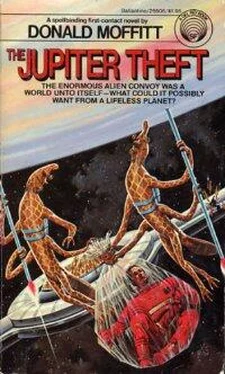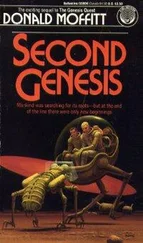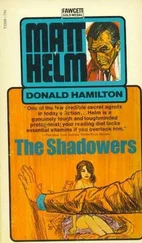They avoided open spaces like the plague, climbing the pipeline beanstalk as it wound its way through the niches and flues and chambers that riddled the outer layers of the shaft, and leaving it for alternate routes whenever it emerged into some roomy expanse.
Twice more they came upon dead Cygnans. One had been turned into orange hamburger by Klein’s automatic weapon. The other had been burned—perhaps by Chia’s laser—and hacked apart needlessly by an ax. Klein had left a trail of minuscule spy instruments, but the humanoids were adept at finding these by the scent of the human oils that had been left on them. Jameson destroyed them as fast as they were found and tried not to worry about them.
“They’ll be terrified if they see us coming after them,” Ruiz grunted. “Kitchen knives and wrenches and a couple of cute pink mascots.”
“They might not have seen us,” Jameson said. “They won’t be monitoring their bugs continuously—just spot-checking them.”
They were bobbing around like balloons by this time, in gravity that was too weak to notice, launching themselves upward in giant swoops. For the vertical ascents, the humanoids changed their mode of travel, boosting themselves along the ducts and cables, their faces never far from a surface.
Eventually they found themselves in a small, crazily shaped room whose ceiling was a doughy substance that dimpled when Jameson experimentally poked a finger into it. The dimple began, slowly, to fill itself as he watched. Around them was the terrifying hiss of escaping air. The whole chamber was part of a huge gasket—a gasket with a faulty seal, as it happened—and Jameson knew that the leviathan bulk of the starship’s, main body hung above, with its three-sided forests and leaning turrets and the inconceivable energies of the interstellar drive sleeping within its spine.
There was a puckered area in the center of the ceiling. Without hesitation, one of the humanoids leaped straight upward. Its head and shoulders sank into the navel-like depression. It wriggled briefly, and its legs disappeared from view. The second humanoid gibbered encouragingly, exuding an odor of perspiring feet.
“I’ll go first,” Jameson announced. “Then you, Hernando—careful not to stab me with that spear. Maggie, you’re next. Dmitri, you bring up the rear.”
He sprang for the dimpled spot, and it swallowed him up. He fought his way upward through the doughy sphincter, all his senses muffled. After he’d forced his way through it for what seemed an inordinate distance, he had a moment of panic. What if he was simply burrowing into a thousand feet of insulation, to smother deep within its yielding mass? But common sense told him that the humanoids must have picked up traces of human scent. This was a definite passage, perhaps an emergency route. He could breathe in the spaces his head and shoulders opened up, though the air was stale. After what seemed hours, the spongy stuff disgorged him into an echoing void that smelled of metal and lubricants.
He was clinging to a metal slope that tilted to a dim gorge beneath. Across an intervening space a tentlike wall of metal leaned massively inward, its angle matched to the cliff he clung to.
To his right the view stopped at what he at first took to be mountain ridges, until he realized that he was looking at the edge of a great toothed wheel half a mile across. There was a gargantuan jumble of machinery—ratchets and pawls and pinions on a scale that made him feel like a flea in a tower clock. To his left the enormous metal cavern stretched on for miles, and he knew that he had finally reached the axis of the ship.
The ancient metal of the cliff was scarred and pitted, its face pocked with handholds and even places to stand. He eased off to one side and helped Ruiz through, then Maggie and Dmitri. The other humanoid wriggled through last.
The feathery beings motioned him to silence and pointed up toward the peak of the metal mountain. Their gestures told him to be cautious.
He climbed the rusty slope and reached the top, another fifty feet up. He peeked over the edge. Down at the bottom of that toboggan-slide incline was another gorge, rising to another inward-leaning cliff.
Figures were moving around down there.
Human figures, tiny with distance. They milled around a projecting housing that had to be an air lock. It had a round door, pulled out like a drawer front on three shafts. Some of the figures, bulkier than the others, were either wearing spacesuits or being helped into them.
There was no way he could slide down the metal toboggan slope without being seen a long way off. Was there a way around the end of the ridge, where those gigantic gears meshed?
He eased himself cautiously down a foot and sighted along the crest.
And froze.
A mob of dark shapes was pouring out of the shadowed spaces behind the titans’ gears and swarming purposefully along the ridge toward him. Jameson fumbled for his rope and hammer. He had just time enough to glance down the slope, and see that the humanoids had disappeared, when the dark shapes halted a couple of yards away. They started to deploy themselves down the two sides of the ridge to encircle him.
The one straddling the ridge, keeping his feet planted to keep from drifting off in the almost nonexistent gravity, was Gifford. He was hefting an ax. The others, wielding axes and crowbars, were members of the Chinese missile crew, six men and a chunky, muscular-looking girl.
Across the intervening space, Gifford grinned at him like a crew-cut ape. With his snub nose and flat boyish features he looked just as open and friendly and uncomplicated as he always had. He shifted his grip on the ax.
“Too bad, Commander,” he said. “You overlooked a couple of the bugs.”
Jameson threw the hammer. He threw it a couple of yards to the side of Gifford, reining in the cord that was tied to it as he did so. The six-pound maul caught Gifford in the ribs, knocking him sideways off the ridge. He began his long, slow tumble to the floor of the gorge, helpless to arrest his fall.
Jameson continued hauling in on the cord, imparting further momentum to the hammer. Next it caught one of the Chinese missile men in the side of the head, sending him rolling in slow motion down the steep slope, his crowbar clattering and bouncing along with him.
Jameson kept the hammer twirling like a lariat. It whizzed full circle around him and knocked the girl’s legs out from under her. She toppled backward and floated toward the floor of the metal canyon. Her head hit the cliffside about a hundred feet down. She’d gathered enough inertia by then for a broken skull, despite the low gravity.
Out of the corner of his eye, Jameson saw Ruiz scrambling up the slope with his spear, Dmitri and Maggie behind him. One of the Chinese stepped inside the whirling arc of the hammer. As he raised an ax, the rope twanged into him from the other side and the hammer, its pendulum swing shortened, wrapped him round in a cocoon of rope. Jameson tugged sharply, and the man went sprawling down the slope, taking rope and hammer with him.
In a split-second glance, Jameson saw that Gifford’s feet had made contact with the slope about two hundred feet down. He was running desperately, trying to keep on his feet, unable to stop because of his momentum. He’d have to keep running, faster and faster, all the way to the bottom, hoping that he wouldn’t take a tumble. If he survived without broken bones, he wouldn’t be back up here in a hurry.
With the whirling hammer gone, the other Chinese were closing in on Jameson. One of them was almost on top of him, raising an ax over his head with both hands. Jameson reached for the wrench in his belt, with the sickening realization that he wasn’t going to get it out in time, wasn’t going to be able to dodge out of the way, before the ax blade came crashing down on him.
Читать дальше












